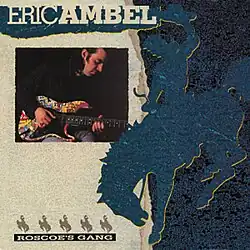Roscoe's Gang
| Roscoe's Gang | ||||
|---|---|---|---|---|
 | ||||
| Studio album by | ||||
| Released | 1988 | |||
| Recorded | 1988 | |||
| Studio | Column One, Springfield, Missouri | |||
| Genre | Rock, country rock | |||
| Label | Enigma | |||
| Producer | Lou Whitney, Eric Ambel | |||
| Eric Ambel chronology | ||||
| ||||
Roscoe's Gang is the debut album by the American musician Eric Ambel, released in 1988.[1][2] Its title is a reference to the band Ambel would use for casual New York City bar gigs.[3] He supported the album with a North American tour.[3]
Production
The album was recorded at Column One in Springfield, Missouri, with members of the Morells, and coproduced by the band's bass player, Lou Whitney.[4][5][6] The cover of Neil Young's "Vampire Blues" was recorded in one take.[7] "Total Destruction to Your Mind" is a cover of the Swamp Dogg song.[8] "If You Gotta Go, Go Now" was written by Bob Dylan.[9] "Loose Talk" is a version of the song made famous by Buck and Bonnie Owens.[10] "Don't Wanna Be Your Friend" and "I Waited for You" were written by Ambel's Del-Lords bandmate Scott Kempner.[7] "Next to the Last Waltz" was cowritten by Peter Holsapple.[11] "Power Lounger Theme" is an instrumental.[10] Syd Straw and Skid Roper contributed to the recording sessions.[12]
Critical reception
Newsday said that Roscoe's Gang is "what a solo album should be: an off-hand, unaffected, underproduced busman's holiday."[7] The Chicago Tribune opined that "Ambel's true talents still seem to lie in rock 'n' roll territory, the best songs here being some strutting, full-power rockers."[14] The New York Times praised the "cheerfully rowdy material".[22] The Calgary Herald labeled the music "raunchy rock and gritty country-rock".[23] The Morning Call concluded that Ambel "does [rock] better than Jason & the Scorchers or the Georgia Satellites".[24]
The Ottawa Citizen noted that unlike Ambel's work with the Del-Lords and the Blackhearts, the music is "less contrived and exudes pure intentions."[19] The Philadelphia Inquirer stated that "this is wonderfully raw, passionate music that never loses its sense of humor."[20] The Boston Globe admired the "inspired primitivism" and "loose and unencumbered" performances.[25] The SouthtownStar likened the music to "the Rolling Stones meet the dB's".[21] Playboy noted that "Ambel's guitar expertise ranges from country to hard rock to pop metal".[26]
Track listing
| No. | Title | Length |
|---|---|---|
| 1. | "If You Gotta Go, Go Now" | |
| 2. | "Total Destruction to Your Mind" | |
| 3. | "The Girl That I Ain't Got" | |
| 4. | "Forever Came Today" | |
| 5. | "30 Days in the Workhouse" | |
| 6. | "Power Lounger Theme" | |
| 7. | "Don't Wanna Be Your Friend" | |
| 8. | "I Waited for You" | |
| 9. | "Next to the Last Waltz" | |
| 10. | "Loose Talk" | |
| 11. | "You Must Have Me Confused" | |
| 12. | "Vampire Blues" | |
| 13. | "Power Lounger Theme Part 2" (Guitar) |
References
- ^ Robbins, Ira A. (1991). The Trouser Press Record Guide. Collier Books. p. 181.
- ^ Hutton, Lindsay (October 21, 1989). "Albums: Eric Ambel". Melody Maker. Vol. 65, no. 42. p. 39.
- ^ a b MacInnis, Craig (January 6, 1989). "Roscoe's Gang timely tonic to pop killjoys". Toronto Star. p. E14.
- ^ Sylvester, Ron (December 19, 1988). "Live (on tape) from Springfield!". The Springfield News-Leader. p. D1.
- ^ a b Racine, Marty (December 25, 1988). "Records". Zest. Houston Chronicle. p. 11.
- ^ McNeese, Don (January 13, 1989). "Eric Ambel dishes up party platter with 'Roscoe's Gang'". Weekend Plus. Chicago Sun-Times. p. 35.
- ^ a b c Robins, Wayne (December 11, 1988). "Eric Ambel: 'Roscoe's Gang'". Part II. Newsday. p. 29.
- ^ Hochman, Steve (January 30, 1989). "Back-Yard Party Rock from Ambel and Gang". Calendar. Los Angeles Times. p. 3.
- ^ Harrison, Tom (April 23, 1989). "Eric Ambel: Roscoe's Gang". Living. The Province. p. 81.
- ^ a b Bumgardner, Ed (December 24, 1988). "Eric Ambel Creates Rock 'n' Roll to Live By". Entertainment Week. Winston-Salem Journal. p. 6.
- ^ Pick, Steve (December 9, 1988). "Critic's Choice". St. Louis Post-Dispatch. p. 4H.
- ^ Lloyd, Robert (January 26, 1989). "The Critical List". LA Weekly. p. 49.
- ^ All Music Guide to Rock. Miller Freeman Books. 1995. p. 19.
- ^ a b Popson, Tom (January 20, 1989). "The Insider". Friday. Chicago Tribune. p. I.
- ^ Larkin, Colin (1998). The Encyclopedia of Popular Music. Vol. II. Macmillan. p. 1468.
- ^ Strong, Martin C. (1999). The Great Alternative & Indie Discography. Canongate. p. 192.
- ^ MusicHound Rock: The Essential Album Guide (2nd ed.). Visible Ink Press. 1999. p. 327.
- ^ Browne, David (January 22, 1989). "Pop Music". City Lights. Daily News. New York. p. 21.
- ^ a b Erskine, Evelyn (March 3, 1989). "Eric Ambel Roscoe's Gang". The Ottawa Citizen. p. C6.
- ^ a b Tucker, Ken (December 29, 1988). "Pop". The Philadelphia Inquirer. p. 5G.
- ^ a b Everson, John (January 15, 1989). "Pop Stops". SouthtownStar. p. C7.
- ^ Pareles, Jon (February 3, 1989). "Gang's All Here". The New York Times. p. C4.
- ^ Muretich, James (March 2, 1989). "Disc Drive". Calgary Herald. p. F6.
- ^ Righi, Len (February 18, 1989). "Records". The Morning Call. p. A71.
- ^ Wykoff, David (January 12, 1989). "Recordings". Calendar. The Boston Globe. p. 6.
- ^ Young, Charles M. (April 1989). "Music". Playboy. Vol. 36, no. 3. p. 28.